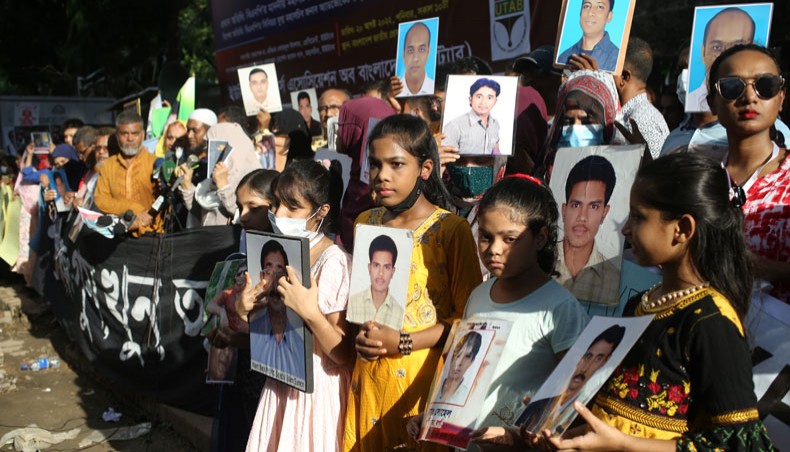
Family members of the victims of enforced disappearances were crying for justice as the government neither launched an independent investigation to identify perpetrators involved in disappearances nor could find the whereabouts of their family members who had vanished for years.
The family members said that members of law enforcement and intelligence agencies took them to different places over the years, but they could not find any trace of their missing near and dear ones.
Against these backdrops, family members of enforced disappearance victims will observe the International Day of the Victims of Enforced Disappearances today in Bangladesh through different programmes.
The United Nations has been observing the day on August 30 every year since 2011 to express solidarity with the family members of the victims of enforced disappearance.
The Bangladesh government employed police and National Security Intelligence, among others, for an internal inquiry into the reported cases of disappearance, but none of those were made public.
Recently, the Dhaka Metropolitan Police, in an internal letter dated May 9, 2023, asked all its crime and detective branches to collect details of around 50 cases of disappearances.
And in June, NSI members also visited the houses of other victims across the country.
On September 20, 2022, UN Working Group on Enforced or Involuntary Disappearances chair-rapporteur Luciano A. Hazan urged the Bangladesh government to implement the recommendations made by the immediate past UN High Commissioner for Human Rights, Michelle Bachelet, during her visit to Bangladesh.
The UN rights boss encouraged the government to create an independent, specialised mechanism that works closely with victims, families, and civil society to investigate allegations of enforced disappearances and extrajudicial killings.
‘My office is ready to provide advice on how such a body could be designed in line with international standards,’ Bachelet announced in Dhaka on August 17, 2022.
Home minister Asaduzzaman Khan, however, denied any enforced disappearances were taking place in Bangladesh.
‘There is nothing called enforced disappearance in Bangladesh. We checked a UN list and found 28 people had resurfaced. We think the rest went into hiding. When our police detain an individual, he is produced in court on time,’ Asaduzzaman told New Age on Monday.
The home ministry gathered updated information on 76 cases of disappearance recorded with the WGEID and passed it on to the UN.
The home ministry, however, did not launch any criminal investigation into those cases, which were mostly related to politics or bilateral issues with India.
Human Rights Watch published a list of 86 victims of disappearances, but no investigation was carried out by the government into those cases.
The Asian Human Rights Commission documented 623 cases of short- and long-term disappearances between January 2009 and June 2022.
Of them, 153 individuals remain missing, while 84 have been found dead later, 383 have resurfaced, and no updates have been found about the three cases.
It documented 659 cases of disappearances—short-term and long-term—taking place between January 2009 and June 2023.
Mohammad Ashrafuzzaman, the liaison officer at the Asian Human Rights Commission, explained that the victims of enforced disappearances had been facing a systemic denial of universal access to justice in Bangladesh.
He told New Age that the police, who control the complaint mechanisms, outright rejected registering complaints about enforced disappearances.
‘The magistrate courts subjectively accepted a very few petition cases, while none of them have ever led to any criminal investigation or a judicial probe, except one case from Satkhira district,’ he said.
‘However, that probe report into the Satkhira disappearance case has not yet led to any prosecution of the perpetrating police officers,’ he said.
Ashrafuzzaman accused the law minister, the home minister, and the prime minister of consistently making untrue statements about enforced disappearances to vilify the victims and their families, which directly patronised the crime of disappearances.
‘The Supreme Court of Bangladesh has failed to uphold its constitutional mandate of giving remedies to the petitioners of habeas corpus, although the families sought justice facing multiple challenges in their everyday lives,’ he said.
Sanjida Islam Tulee, a co-founder of Maayer Daak, a platform representing the families of the victims of enforced disappearances, told New Age that they want their family members back without any delay and want justice through an impartial mechanism endorsed by the UN and global rights groups.
Tulee’s brother, Shajedul Islam Sumon, who was Dhaka city’s Ward 38 unit general secretary of the Bangladesh Nationalist Party, along with seven others, were victims of disappearance in December 2013, just weeks before the January 5, 2014 national elections.
She blamed RAB for the disappearances of her brother and others, an allegation that the security forces consistently denied.
Like her, Nasrin Jahan Smrity, wife of missing Mirpur-based trader Ismail Hossain, alleged that a navy official deputed to the RAB was behind his disappearance from the capital’s Mirpur on June 19, 2019.
RAB also denied the allegation.
‘I do not think I will get justice from the existing criminal justice delivery system. It is only possible once an UN-supervised and global human rights organisation-monitored investigation takes place for our justice,’ she told New Age.
Jamila Akhter, a resident of Baghmara in Rajshahi, said that RAB personnel took away her husband, Mohammad Abdul Kuddus Pramanik, in front of our house in March 2017, and the whereabouts of him and two others are still unknown.
‘I demand justice for whoever was involved in the disappearance,’ she said.
‘We seek intervention from the UN and international community in order to bring back our dear ones and stop the recurrence of such incidents,’ she said.
Human rights activist Mohammad Nur Khan said they had hardly seen any investigation into the cases of enforced disappearances taking place over the years.
He said that an independent, high-profile committee should be initiated to probe those cases, as impunity helps repeat such crimes.
More about:
This post was originally published on this site be sure to check out more of their content.









